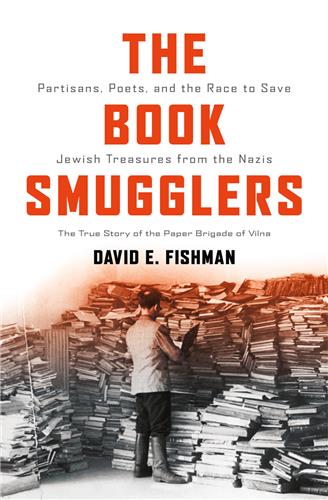[A] work that is scholarly and intimate, descriptive and personal... First-rate scholarship that pulses with the beat of a most human heart.
The Book Smugglers is the nearly unbelievable story of ghetto residents who rescued thousands of rare books and manuscripts—first from the Nazis and then from the Soviets—by hiding them on their bodies, burying them in bunkers, and smuggling them across borders. It is a tale of heroism and resistance, of friendship and romance, and of unwavering devotion—including the readiness to risk one’s life—to literature and art. And it is entirely true. Based on Jewish, German, and Soviet documents, including diaries, letters, memoirs, and the author’s interviews with several of the story’s participants, The Book Smugglers chronicles the daring activities of a group of poets turned partisans and scholars turned smugglers in Vilna, “The Jerusalem of Lithuania.” The rescuers were pitted against Johannes Pohl, a Nazi “expert” on the Jews, who had been dispatched to Vilna by the Nazi looting agency, Einsatzstab Reichsleiter Rosenberg, to organize the seizure of the city’s great collections of Jewish books. Pohl and his Einsatzstab staff planned to ship the most valuable materials to Germany and incinerate the rest. The Germans used forty ghetto inmates as slave-laborers to sort, select, pack, and transport the materials, either to Germany or to nearby paper mills. This group, nicknamed “the Paper Brigade,” and informally led by poet Shmerke Kaczerginski, a garrulous, street-smart adventurer and master of deception, smuggled thousands of books and manuscripts past German guards. If caught, the men would have faced death by firing squad at Ponar, the mass-murder site outside of Vilna. To store the rescued manuscripts, poet Abraham Sutzkever helped build an underground book-bunker sixty feet beneath the Vilna ghetto. Kaczerginski smuggled weapons as well, using the group’s worksite, the former building of the Yiddish Scientific Institute, to purchase arms for the ghetto’s secret partisan organization. All the while, both men wrote poetry that was recited and sung by the fast-dwindling population of ghetto inhabitants. With the Soviet “liberation” of Vilna (now known as Vilnius), the Paper Brigade thought themselves and their precious cultural treasures saved—only to learn that their new masters were no more welcoming toward Jewish culture than the old, and the books must now be smuggled out of the USSR. Thoroughly researched by the foremost scholar of the Vilna Ghetto—a writer of exceptional daring, style, and reach—The Book Smugglers is an epic story of human heroism, a little-known tale from the blackest days of the war.


A work that is scholarly and intimate, descriptive and personal… First-rate scholarship that pulses with the beat of a most human heart.
Kirkus Reviews
[A] work that is scholarly and intimate, descriptive and personal... First-rate scholarship that pulses with the beat of a most human heart.
[A] gripping narrative. . . . Fishman narrates his story with verve and considerable literary skill, practising narrative history in the literal sense.
Masterful prose. What a pleasure it is to have a good read, a first-rate history, and a new perspective on Jewish cultural resistance all wrapped up in one fascinating book.
[A] fascinating new study.
The immediate and unfiltered personal stories of the book smugglers make for a powerful read. They convey the timeless message that, even in the most extreme circumstances, we still have a choice, however minimal, about how to respond to existential threats.
Riveting and often heart-pounding. . . . [Fishman] writes with a historian’s precision, but also with an eye for character and detail that rises to the level of literature. . . . Essential reading for anyone who cares about books, Jewish history, and the capacity of individuals to defy mighty regimes to keep civilization alive.
An inspiring portrait of ghetto inmates’ courage and fidelity in response to the Nazi regime’s plundering of Jewish culture in occupied Vilna.
As a Hungarian Jew I thought I knew a lot about the ghettos of Eastern Europe under the Nazis. David Fishman proved me wrong. His book brings fascinating new material to light. . . . It is a deeply researched work of a great scholar and a gripping, essential, and compelling read.
A fascinating addition to the literature of the cultural devastation of World War II and its aftermath that illuminates the little-known saga of the courageous efforts to save the precious libraries, manuscripts, and archives of the Jews of Eastern Europe.
e often forget that the Third Reich destroyed, in addition to a significant segment of the Jewish people, a treasure trove of Jewish cultural artifacts. The Book Smugglers tells the improbable story of the rescue of a portion of that trove—not once but twice.
DAVID E. FISHMAN teaches history at the Jewish Theological Seminary in New York. His involvement with the story recounted in The Book Smugglers began twenty-five years ago, when he was invited to consult on items discovered in a former church in Vilnius. He is the author of four scholarly monographs and one textbook.

Founded in 1971, Brandeis University Press is a nonprofit publisher dedicated to publishing innovative, high-quality books for a general audience, as well as scholarship that advances knowledge and promotes dialogue in the humanities, arts, and social sciences around the world.
© Copyright 2024, Brandeis University Press
Brandeis University Press
Goldfarb Library 69-235, MS 046
Brandeis University
415 South Street
Waltham, MA 02453
(781) 736-4547
pressinfo@brandeis.edu

Stay up to date with the newest titles and promotions from Brandeis University Press—while saving 20% on your first purchase.